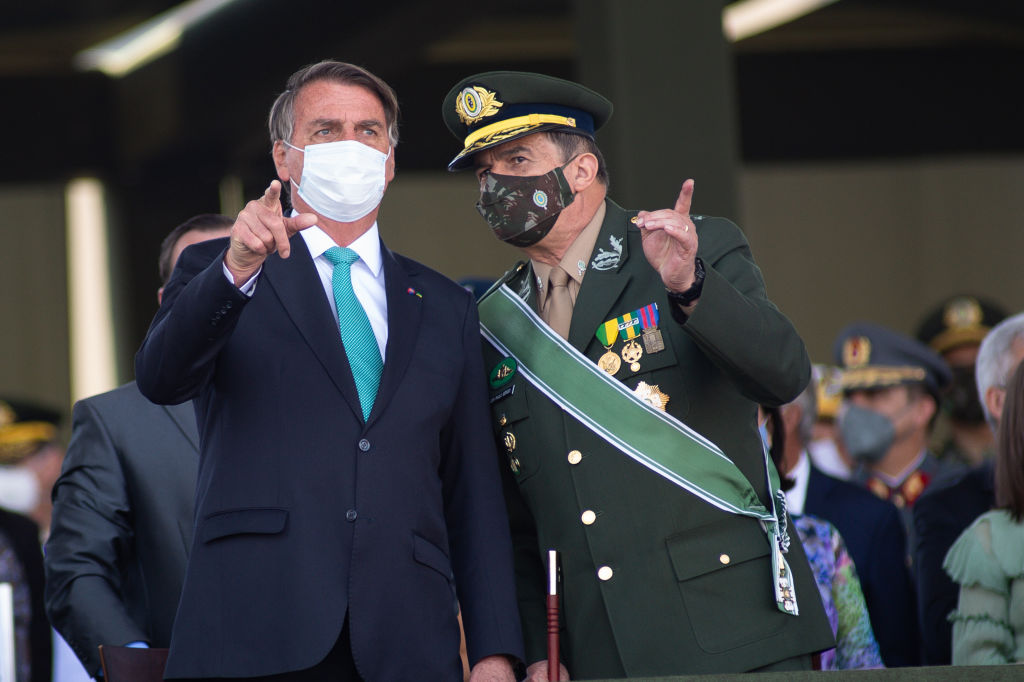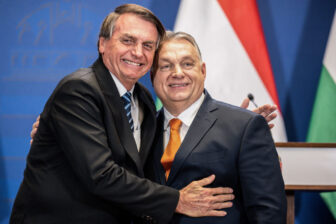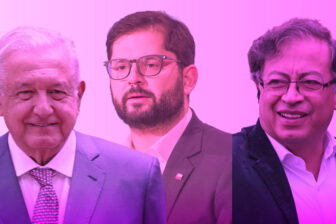This article was adapted from a piece first published in the magazine Interesse Nacional.
BRASÍLIA — The question comes up all the time. In interviews, conversations and meetings, I am constantly asked: Will there be a coup in Brazil? And my answer is always the same: No. Here are my arguments, which also haven’t changed.
People who fear a coup—either in good faith or because they see a political benefit from instilling this fear—usually bring up the 1964 intervention that marked the beginning of the country’s 20-year military dictatorship. But this is a very tenuous comparison. In 1964, mainstream media, the private sector almost in its entirety, the middle class, churches (with Catholics at the helm), political parties themselves and our “big brother” in the North, the U.S., were all sympathetic to a military intervention. Brazil was in chaos. Inflation was eating up salaries, there were constant strikes and military hierarchy was being threatened by insubordination in the barracks. The social and political environment was favoring those pushing for the intervention that interrupted a democratically elected government.
Nothing even close to that is happening now. Neither the media nor the private sector, the middle class, the churches or political parties are defending or promoting a military intervention. And the country’s institutions aren’t as fragile as they were then—quite the opposite, in fact. And as for external support, CIA Director William Burns shared a direct message from the Biden administration to Brazil’s government: The U.S. is against any action that would lead to a break in the constitutional order. That message that seems to have been repeated by Joe Biden himself to Jair Bolsonaro during their meeting at the Summit of the Americas.
Increasing fears of a coup or intervention have been fostered by President Bolsonaro’s own actions and words. With former President Luiz Inácio Lula da Silva consistently leading the polls for the October election with a margin of almost 20 points, Bolsonaro has continued sowing doubt over the election process and the integrity or usefulness of the supreme court, while picking another army general as his running mate.
Next, let me dispel another recurring thesis, that the constant changes at the head of the defense cabinet and the resignation of all three heads of the armed forces in March 2021 are signs that something is being plotted. It’s true Brazil has already had three defense ministers over the three and half years of this administration. But the rapid turnover is in fact an indication that the top brass of the armed forces is resisting the pressure to join anti-democratic adventures, and departing as a result.
My interlocutors will often bring up the public avowals of support for the president by generals currently occupying government posts, or the dispute pitting the defense minister and the army against the Electoral Court (TSE) over the integrity of the election system. But those who truly speak for the military are the active-duty commanders, not those occupying civilian posts. And commanders in the Brazilian navy, army and air force, with exceptions for a few less careful remarks, have stayed away from politics.
The large number of military personnel in this administration is a good argument for caution, as we currently have the largest contingent of military figures in politics in our recent political history. But this does not equate with plotting a coup. What it really shows is the failure of Congress to carry out its non-transferable duty of defining the role of the armed forces and national defense. Regulation should define limits and specify where military personnel can and cannot have a role in politics. But Congress has systematically alienated itself from this obligation. It is as if national defense, the reason for having armed forces, a role that encompasses preserving the integrity of our territory, our people, our culture, natural resources and sovereignty, is utterly uninteresting to Congress.
What do our servicemen and women make of this? I don’t claim to represent them, but I do believe that they see in this Congress’ political irresponsibility towards the defense of our nation. This then reinforces a historical sentiment among the military of their duty as guardians and protectors of Brazil against any threat. And I’d add that the constant criticism of the military’s presence in the administration implies that the decision to join the government was theirs, which isn’t the case.
And we now come to the current pressure point, which is the face-off between the Electoral Court (TSE) on one side and the army and the minister of defense on the other. The president insists that the army should have a decisive supervisory role over the vote-counting process—which in Brazil is done electronically—even having its own parallel system. The Army has publicly complained about not being heard by the TSE, while the current defense minister, an army general himself, continually make demands related to procedures.
There are two points to make here. First, there is no constitutional basis for the military to have a supervisory mode over the TSE or the Supreme Court. But second, the army was invited by the TSE, in an unprecedented gesture, to help scrutinize the security of the electronic electoral system. It may not have occurred to the TSE that inviting a representative of the armed forces to join their transparency commission was akin to inviting the entire military institution—including its commander in chief, the president. This invitation increased tensions and created a new pressure point with the military.
The role of precedent
It is necessary here to bring up a background issue. Currently, a large portion of the upper echelons of the armed forces—navy, army and air force; active duty and retired—view the Supreme Court as generating instability and insecurity themselves by acting beyond their constitutional boundaries. Their criticism goes from the atmosphere of judicial uncertainty resulting from the Court’s constant changes on several issues, to a sense that the court is overstepping the executive branch—even appointing a cabinet member in the previous administration—as well as the public attorney’s office.
There is also the perception that the court was responsible for the end of the Lava Jato anti-corruption operation, especially due to a decision of Justice Edson Fachin that opened the way for a review of several judicial decisions, including the rulings against former president Luis Inácio Lula da Silva. This conflict involving two state institutions is serious. There are no noticeable initiatives for dialogue on either side, which is worrying. Add that to the inaction of Congress on national defense and the climate of polarization and accusations involving (and starting in) the president’s office.
Many are worried about a nontraditional coup—not one involving tanks on the streets, but one in which servicemen and women could support a situation like what happened on January 6, 2021 in the U.S. But that scenario is just not feasible. Despite the acrimony between the armed forces and the judicial branch, both see themselves as institutions of the state, not as a property of this government. But this does reinforce the need for Congress to take the lead in defining our national defense strategy, including regulating the role of the armed forces. Now, this is clearer than ever.
It is up to Congress to lead through dialogue with the military and society—to create a national defense project that favors national interests and gives us the capability to face real and potential threats. It must include working conditions that are consistent with the mission of the armed forces. In addition, the country needs a robust defense base, focused on industry, innovation and technology.
Only twice over the last 35 years have these topics been addressed. The first was during the Fernando Henrique Cardoso administration, with the creation of the ministry of defense. The second was during Lula’s government, when a National Defense Policy and Strategy was submitted to Congress in 2010. The country had never had anything like it and it should have given rise to a historic dialogue between the political class and the Armed Forces.
That hope was largely frustrated. Parliament has never called on the military for a dialogue on national defense, never held hearings or called upon experts, academia, or civil society to enter this debate. Poor quality, generic reports and opinions were produced, little more than excerpts from the National Defense Policy and Strategy document.
Harvard professor Roberto Mangabeira Unger was probably right when he stated that the elites and political power in Brazil “only want to appease the military, granting them, here and there, a frigate, some tanks or planes,” when it is the defense of the country that is at stake.
This lack of interest in a defense plan has several causes. First, the feeling that the country is historically not under any threat. Our last war, with Paraguay, was more than 150 years ago. Second, the fact that national defense does not translate into votes. And lastly, there are no commissions to which to appoint politicians and capture political-electoral benefits.
Changing that will only be possible if our elites and especially our politicians create a consistent and modern national defense framework, one that is developed alongside our foreign policy and that projects our national interests. My expectations of that happening in a future government are minimal. Neither the current government, nor the opposition, much less the presidential candidates, have so far outlined any program or list of intentions about national defense and the role of the armed forces. None of the websites or platforms of the almost 30 political parties Brazil has today have any such program. In short, and I hope I’m wrong, little or nothing will change in the relationship between political institutions and the armed forces.
It isn’t out of the question that the constant rhetoric casting doubt over the electoral process could—depending on the election results—could cause tension in parts of the electorate, including among officers tasked with public security. But I repeat that I do not see the possibility of a “military intervention” as so many analysts anticipate. There are no external conditions for this, motivations, processes or plans from the part of the armed forces. Whoever wins the presidential race, the military will have the elected president as its commander in chief, as required by the constitution.
—
Jungmann served as Brazil’s defense and public security minister from 2016 to 2018. Prior to that he was agricultural minister and also served as head of the federal agrarian and environmental institutes.








